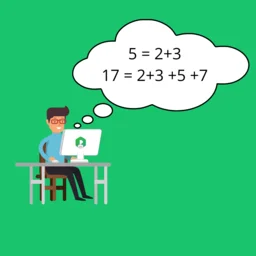C Program for Consecutive Prime Sum (TCS Codevita) | PrepInsta

Consecutive Prime Sum Problem Solution in C
Consecutive Prime Sum is one of the challenging problem which was asked in the sample questions of TCS CodeVita 2020 Season 9 edition. TCS CodeVita is one of the toughest coding competition throughout the world. Last year there were more than 2 lakhs coders who participated in this contest, and only 25 coders reached the grand finale round. Here you will find the solution of Consecutive Prime Sum problem in C programming Language
Problem Description
Question – : Some prime numbers can be expressed as a sum of other consecutive prime numbers.
- For example
- 5 = 2 + 3,
- 17 = 2 + 3 + 5 + 7,
- 41 = 2 + 3 + 5 + 7 + 11 + 13.
Your task is to find out how many prime numbers which satisfy this property are present in the range 3 to N subject to a constraint that summation should always start with number 2.
Write code to find out the number of prime numbers that satisfy the above-mentioned property in a given range.
Input Format: First line contains a number N
Output Format: Print the total number of all such prime numbers which are less than or equal to N.
Constraints: 2<N<=12,000,000,000
| S.no | Input | Output | Comment |
|---|---|---|---|
| 1 | 20 | 2 | (Below 20 there are two such members; 5 and 17) 5=2+3 17=2+3+65+7 |
| 2 | 15 | 1 |
C Code for Consecutive Prime Sum Problem
#include <stdio.h> int prime(int b); int main() { int i,j,n,cnt,a[25],c,sum=0,count=0,k=0; printf("Enter a number : "); scanf("%d",&n); for(i=2;i<=n;i++) { cnt=1; for(j=2;j<=n/2;j++) { if(i%j==0) cnt=0; } if(cnt==1) { a[k]=i; k++; } } for(i=0;i<k;i++) { sum=sum+a[i]; c= prime(sum); if(c==1) count++; } printf(" %d",count); return 0; } int prime(int b) { int j,cnt; cnt=1; for(j=2;j<=b/2;j++) { if(b%j==0) cnt=0; } if(cnt==0) return 1; else return 0; }
Output Enter a number : 43 4
Consecutive Prime Sum Problem in Other Coding Languages
Python
To find the solution of Consecutive Prime sum problem in Python Programming language click on the button below:
C++
To find the solution of Consecutive Prime sum problem in C++ Programming language click on the button below:
Java
To find the solution of Consecutive Prime sum problem in Java Programming language click on the button below:
Login/Signup to comment



correct method in c language
#include
int i,j,k,x,y,z,a,b,c,sum=0,flag,flag1,n;
int main()
{
printf(“enter the number”);
scanf(“%d”,&n);
for(j=3;j<=n;j++)
{
for(i=2;i<=j/2;i++)
{
if(j%i==0)
{
flag=1;
break;
}
}
if(flag==0)
{
sum=sum+j;
// printf("the number is %d\n",sum);
}
flag=0;
if(a!=sum)
{
for(k=2;k<(sum+2);k++)
{
if((sum+2)%k==0)
{
flag1=1;
break;
}
}
if(flag1==0&&sum<n)
{
printf("the prime of sum of prime number is %d\n",sum+2);
b++;
}
flag1=0;
a=sum;
}
}
printf("the no of sum of prime number is prime possible are %d\n",b);
return 0;
}
Here count will increase for 2+3+5=10 not a prime, then how could we consider this for the count for sum of prime…can anyone plz explain it ????
for(i=0;i<k;i++)
{
sum=sum+a[i];
c= prime(sum);
if(c==1)
count++;
}
printf(" %d",count);
return 0;
}
int prime(int b)
{
int j,cnt;
cnt=1;
for(j=2;j<=b/2;j++)
{
if(b%j==0)
cnt=0;
}
if(cnt==0)
return 1;
else
return 0;
}